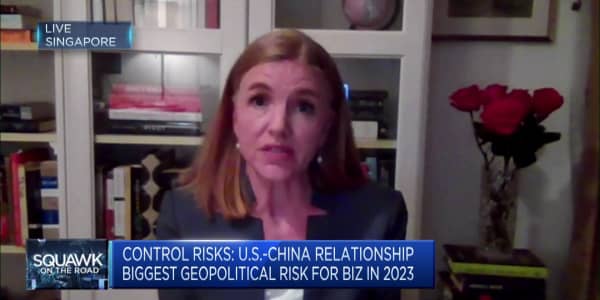Heightened geopolitical tensions in the Middle East and Ukraine have caused a spike in cybercrime and there could be more damaging attacks to come, security experts have warned.
With the extremist militant organization Islamic State carrying out brutal acts of violence in Iraq, continued clashes between pro-Russian separatists and the Ukrainian army, and simmering tensions in Gaza, activists have taken to the cyber world to make political statements thought hacking attacks on government and key financial websites.
"I think we've seen over the last few years a tremendous rise in the volume and sophistication of attacks worldwide," Alastair Paterson, CEO of Digital Shadows, which monitors cyber threats, told CNBC by phone.
Read MoreJPMorgan and other banks struck by cyberattack
"There are groups popping up in all sorts of countries. Any major world event now becomes a target."
People 'upset'
Security researchers have uncovered a host of attacks related to geopolitical crises.
During the height of the Gaza crisis in July, hacktivists – activists using the cyber world for protest – claimed to have taken Israel's security agency Mossad offline. Meanwhile, analysis by Digital Shadows seen by CNBC, shows mentions of "OpSaveGaza" and "OpSaveIsrael" on social media peaked at the start of July when the crisis was at its most tense. The activity remained steady through July and has begun to wind down following the ceasefire between Israel and Palestine, mirroring world events.
Despite a reduction in mentions related to Gaza and Israel, the threat has not subsided. Some hacktivist groups claimed to have taken out the Saudi Stock Exchange website last month due to the country's financial support for "Israeli atrocities", according to the website of activists Hilf-ol-Fozoul.
Due to the easy accessibility of hacking software, experts said angry protestors can cause damage with relative ease.
Read MoreRussia-linked cyber attack on Ukraine PM's office
"It may be related to people that are upset with what is going on and this is their way of reacting," Ilias Chantzos, head of government affairs for EMEA at Symantec, told CNBC by phone.
"The reality is that there is some cyber activity being noticed. But how much of that is politically motivated and government controlled?"
Who's behind it?
US security agencies have been looking into whether these cyber attacks are government-backed. The FBI is investigating the possibility of whether the Russian government is behind a hacking attack on JPMorgan in retaliation for sanctions imposed on President Vladimir Putin's government.
Some hackers are even jumping on the back of interest in geopolitical tensions in order to ramp up the visibility of their attack. Lizard Squad claimed responsibility for hacking into Sony's PlayStation Network and sending out a tweet that Sony Online Entertainment President John Smedley's plane had an explosive on it causing it to be diverted. In their initial tweets, Lizard Squad used the hashtag "ISIS", referencing brutal Islamic group that has taken over parts of Iraq.
Read More'War-like' cybercrime threatens European growth
More extreme?
While the frequency of attacks is certainly on the rise, any bubbling up of geopolitical tensions could see further activity in the cyber world, but the effects could be worse, experts warned.
Former FBI agent Ernest Hilbert said the danger is always that hackers might uncover data with the intention of disrupting a company, but more fanatical criminals with a better skillset could use such information in a malicious way.
"If you get enough people against a particular thing, they will pool their resources and take an attack to whatever extreme they are comfortable with" Hilbert, now the head of cyber investigations for EMEA at risk consultancy Kroll, told CNBC by phone.
- By CNBC's Arjun Kharpal





